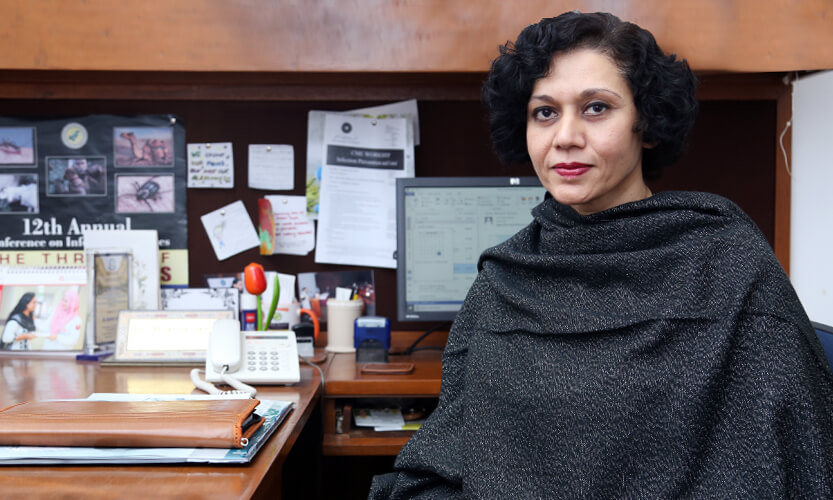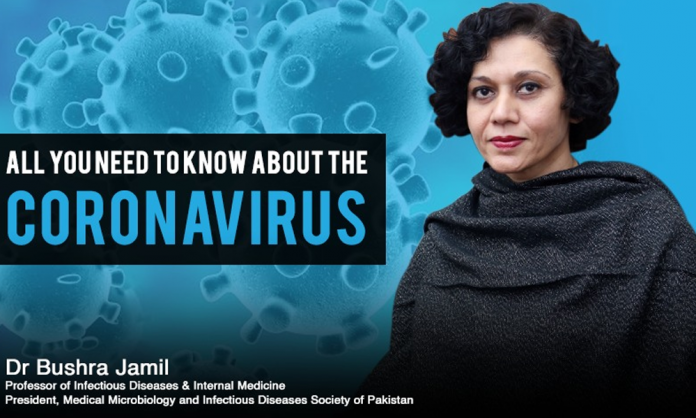The Wuhan Coronavirus is being called a pandemic according to many of the world’s leading experts on infectious disease. A Pandemic is typically described as an epidemic of worldwide proportions. The World Health Organization (WHO) has also recently declared the coronavirus a global health emergency of international concern.
Tedros Adhanom Ghebreyesus, Director-general WHO stated: “our greatest concern is the potential for the virus to spread to countries with weaker health systems and which are ill-prepared to deal with it.”
Pakistan is currently at greater risk of getting infected as thousands of Chinese travel back and forth from China to Pakistan on a daily basis.
We spoke to Dr. Bushra Jamil, Professor of Infectious Diseases and Internal Medicine at Aga Khan University Hospital (AKUH) and President, Medical Microbiology and Infectious Diseases Society of Pakistan regarding the virus and the potential threat that we face.

Q1. The coronavirus has been declared a global emergency with concerns that countries with weaker health systems may not be prepared to deal with it, how will Pakistan cope?
Pakistan in recent years has geared up its preparedness and a will to control and deal with such emergencies. Recently, we have had the example of Salmonella which was dealt in a good way by the government. We are pretty confident that the government will be able to deal with this emergency as well.
Q2. What precautionary measures are being taken by authorities to deal with this virus?
The provincial authorities and those at the federal level are all engaged and they are in touch with subject experts and infectious diseases experts at different hospitals. Case definitions have been prepared and communicated, all the strategies are being discussed and the government is keeping a close eye at the people coming in. China has already imposed a ban on people exiting from Wuhan City and that is the hub of the epidemic. The risk of the disease spreading in the country has been minimized to a large extent.
Q3. What is the origin of the Coronavirus?
This particular novel coronavirus belongs to a class of viruses known to emerge from bats. It is not known completely how it originated. It has been proposed it has been originated from animals specifically probably from bats which spread to other animals and then it jumped to humans.
Q4. What are the symptoms?
The symptoms are that of a respiratory tract infection. The patient will experience flu-like symptoms, sore throat, cough, and runny nose. It is impossible to differentiate it from influenza. Even in serious cases, it can present itself as a serious influenza infection with the involvement of the lungs.
Q5. Since the symptoms are so identical to the flu, is testing the only way to know?
Laboratory testing is the only way to confirm what kind of infection a person has because the symptoms are common and shared by many different kinds of viruses and bacteria.
Q6. Pakistan currently doesn’t have these testing facilities. What should people do if they experience any of the symptoms?
The diagnostic facilities will be available soon. The main message is to not panic because it is a self-limiting illness like other viral infections. People may feel sick for a short period of time and with rest and taking plenty of fluid and paracetamol, they do get better. The mortality is fairly low, up to 4% or so.
Q7. When should you go to the hospital?
If there is high-grade fever, difficulty in breathing, shortness of breath, and drowsiness. These are the symptoms of severe illness and people should seek medical help.
Q8. Are there any vaccines as yet?
There is no vaccine available for Coronavirus even for the ones which have been prevalent for quite some time because infections are generally mild and for any new virus it will take time for the vaccine to be developed.
Q9. Do we have enough isolation wards in case of an emergency at the AKUH and other hospitals?
The disease is mainly transmitted through droplets and in some cases through aerosol so single room isolation is sufficient in most cases and doesn’t require any major restructuring of the already existing hospitals. The currently available facilities should be good enough.
Q10. Are face masks effective to prevent the virus? How does the virus spread?
The virus spreads through large respiratory droplets like when a person coughs or sneezes so the people who are close enough within 6 feet are at risk of getting infected through those droplets.
The regular surgical mask or the regular mask is protective because it blocks the droplets and also it prevents your hands from touching your face, your mouth, your nose. The mask provides a barrier and deters you from touching your face repeatedly.
Q11. What precautions should be taken by those traveling through airports and across countries?
Simple interaction is not sufficient for disease transmission. It is like sitting close to someone who is coughing and sneezing, touching somebody, shaking hands, these are the ways in which the disease can be picked up so keeping the hands clean, keeping them away from the face and mouth and if there is a huge crowd, wearing a mask would be beneficial.
Q12. Why is Pakistan not equipped with labs that can test people with Corona Virus?
There are many different infectious agents and diagnostics tests are not available for each and every one of those agents. For this novel coronavirus, it is a new organism that has emerged. Many countries in the world do not have the diagnostic tests available. China has developed one and is sharing information with other countries to develop diagnostic tests.
Q13. What precautions should people with a weak immune system take?
General precautions
- Avoid crowded places.
2. Stay away from people who have a cough, cold and flu.
3. Keep your hands clean.
4. Keep hands away from the face and wear masks if you can’t avoid crowds.
The main message is to not panic and it’s not that deadly of an infection. The mortality rate is fairly low but not even one person should die from something that can be prevented. Just follow the usual hygiene measures.
The Wuhan Coronavirus is being called a pandemic according to many of the world’s leading experts on infectious disease….
Posted by Brandsynario on Monday, February 3, 2020







































